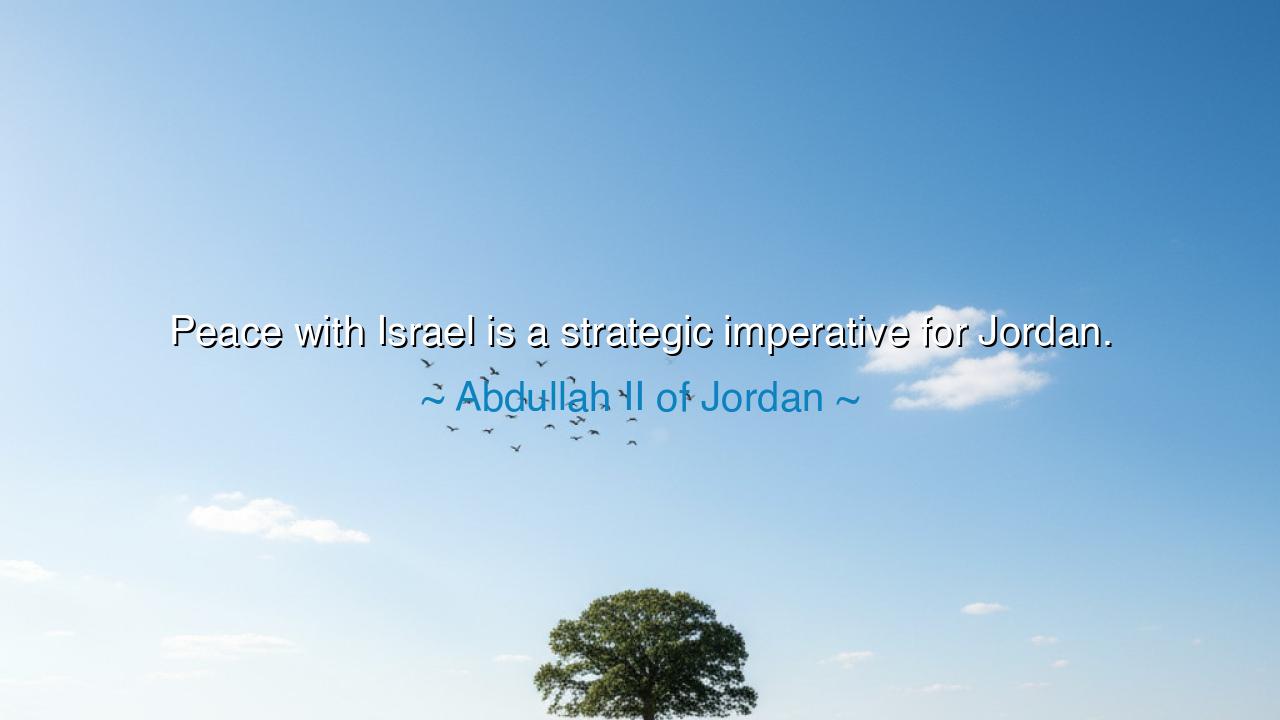
Peace with Israel is a strategic imperative for Jordan.






Hear, O listener, the solemn words of Abdullah II of Jordan, who declared: “Peace with Israel is a strategic imperative for Jordan.” These are not idle words, nor the musings of a dreamer. They are the tempered wisdom of a king who bears the weight of his people’s future upon his shoulders. In them lies the recognition that peace is not merely an ornament of nations, but a necessity, a shield, a foundation upon which survival itself is built. For Jordan, a land small in size yet vast in spirit, the choice of peace is not luxury—it is destiny.
What is meant by strategic imperative? It is the truth that some choices are not optional, but vital. Just as the sailor must have water to sail, just as the warrior must have breath to fight, so too must Jordan have peace to endure amidst the storms of the Middle East. War brings glory only to death, but peace builds life for generations. Abdullah II knew well that the path of endless conflict would consume his nation, draining its strength and sowing sorrow. Thus, he proclaimed peace not as weakness, but as the strongest strategy, the truest defense of his people’s future.
The origin of these words lies in history. In 1994, Jordan signed the Israel–Jordan peace treaty, a moment of both hope and hesitation. After decades of wars that shook the region, the courage of King Hussein, father of Abdullah II, brought forth a pact that sought to end hostility and open paths of cooperation. For Jordan, bordered by lands scarred by conflict, peace was not a gift, but a necessity. Abdullah II, inheriting this legacy, reaffirmed it with his own voice: that peace with Israel is essential to Jordan’s stability, economy, and survival.
History bears witness to the fruits of such choices. Consider the example of Egypt, which under Anwar Sadat dared to make peace with Israel in 1979. Though many condemned him, Sadat knew that his people hungered more for bread than for bullets. That decision reshaped the Middle East, and though Sadat paid with his life, Egypt gained decades of stability. Likewise, Abdullah II’s words echo this truth: sometimes, peace demands courage greater than war, for war is fed by anger, but peace must be built upon vision.
O children of tomorrow, take heed: peace is not born from sentiment alone. It must be woven with strategy, guarded with wisdom, and held as a treasure beyond price. To call peace a strategic imperative is to declare that it is the root of survival, not the branch. Without peace, houses collapse, nations wither, and generations inherit only sorrow. But with peace, the soil is fertile, and the people may labor in hope rather than in despair.
The lesson is clear: in our own lives, as in the lives of nations, we must learn when peace is not simply desirable, but necessary. In families torn by anger, in friendships wounded by betrayal, in communities divided by strife—peace is the only path by which life can endure. Like Jordan, we too must recognize that sometimes reconciliation is not luxury, but survival.
Practical action lies here: seek peace where you can, even when it demands humility, even when it requires sacrifice. Guard against pride, which would have you choose conflict over compromise. Learn to distinguish between battles worth fighting and battles worth laying aside. For the heart, like the nation, cannot thrive if it wages endless war.
So remember the wisdom of Abdullah II of Jordan: peace is a strategic imperative. Not for kings alone, not for nations alone, but for every soul that walks this earth. For only when peace is chosen, guarded, and honored, can houses be secure, nations endure, and the world at last find rest.






AAdministratorAdministrator
Welcome, honored guests. Please leave a comment, we will respond soon